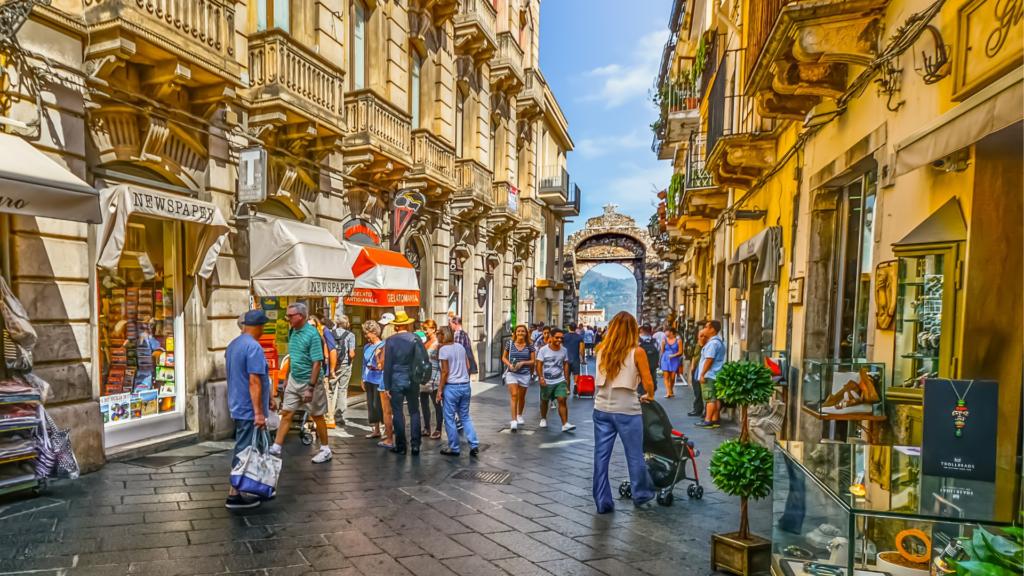Table of Contents
ToggleUnveiling Sicily: Top 5 Enchanting Towns You Can't Miss
Introduction
Sicily, oh Sicily! The Mediterranean’s largest island and an absolute wonderland of history, culture, and jaw-dropping scenery. Influences from Greek, Roman, Arab, and Norman times have left a rich tapestry of traditions and architecture that never fails to spellbind visitors. Amidst all the gems you’ll find here, five towns stand out as absolute must-sees: Palermo, Taormina, Syracuse, Agrigento, and Ragusa. Each of these spots offers a unique slice of Sicilian charm—from ancient ruins to beautiful coastlines and buzzing street life. Ready for an adventure? Let’s dive in and explore these fabulous towns.
Palermo: The Bustling Heartbeat
Palermo, the capital city, truly is the beating heart of Sicily. This place is a melting pot of cultures and flavors, all swirling around in a captivating dance. Founded way back in 734 BC by the Phoenicians, Palermo has seen a medley of civilizations pass through. Nowadays, it’s a delightful mix of historic treasures, lively markets, and to-die-for food.
Architectural Wonders
A visit to Palermo without gawking at its jaw-dropping architecture? Not happening. Take the Palermo Cathedral, for instance. This UNESCO World Heritage site is a dizzying blend of Norman, Moorish, Gothic, and Baroque styles.
It’s basically a history lesson in stone and mortar. Then there’s the Norman Palace, home to the dazzling Cappella Palatina. Trust me, those Byzantine mosaics will leave you speechless.
Vibrant Markets and Delectable Eats
Don’t even get me started on Palermo’s markets. Ballarò and Vucciria are vibrant, chaotic, and absolutely delightful. Wander through and let your senses feast on local delights like arancini (those scrumptious fried rice balls), panelle (crispy chickpea fritters), and the ever-famous cannoli. Palermo’s food scene is like a multicultural party in your mouth.
Art and Culture
If contemporary culture is your thing, Palermo won’t disappoint. From the grand performances at Teatro Massimo, one of Europe’s largest opera houses, to numerous galleries and museums such as the Museo Archeologico Regionale, there’s art and culture oozing from every corner.
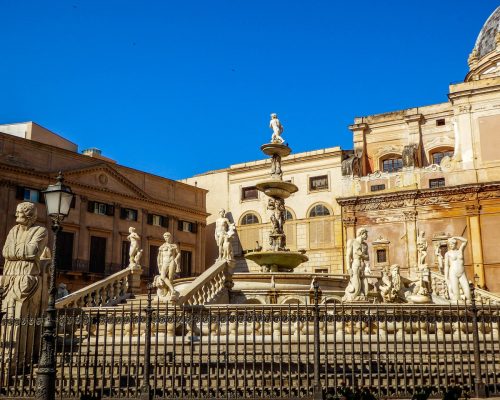
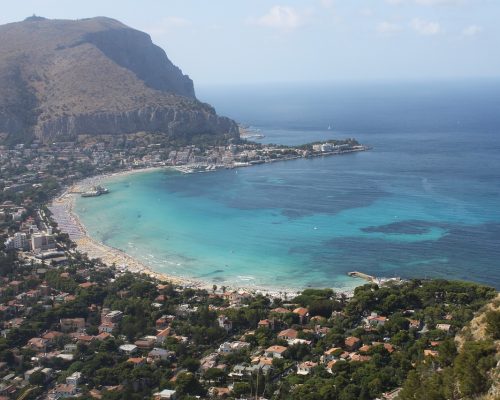
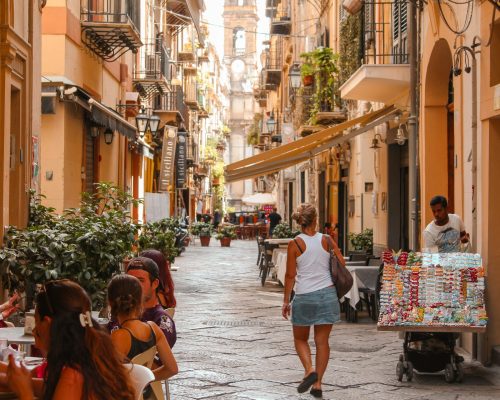
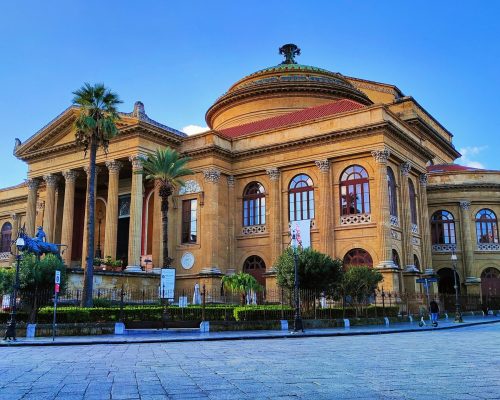
Taormina: The Stunning Cliffside Jewel
Ah, Taormina. Perched high on a hillside overlooking the Ionian Sea, it’s like walking into a postcard. The views, ancient ruins, and charming streets have made Taormina a go-to for beauty and relaxation seekers.
The Ancient Theatre
The crown jewel of Taormina? The ancient Greek Theatre (or Teatro Greco). This marvel from the 3rd century BC offers killer views of both the sea and Mount Etna. Imagine watching a concert there—talk about a dramatic backdrop!
Quaint Streets and Serene Gardens
Take a leisurely stroll along Corso Umberto, Taormina’s main drag, brimming with boutiques, cafes, and historic gems. Feel like decompressing? Head to the public gardens, Giardini della Villa Comunale. The lush greenery and panoramic views are just the ticket.
Beaches and Natural Wonders
Looking to chill by the sea? Taormina’s got you covered with beautiful beaches like Isola Bella. Connected to the mainland by a slim strip of land, it’s a nature reserve and a paradise for marine life.
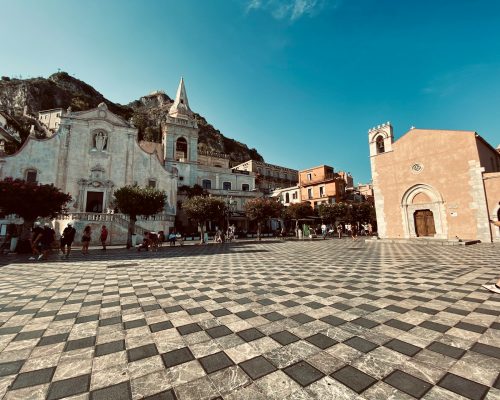
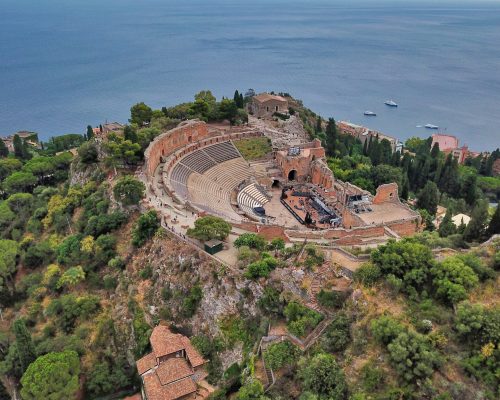
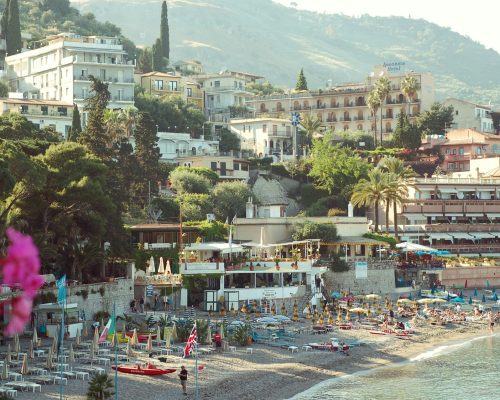
Syracuse: A Time Traveler’s Dream
Syracuse, sitting pretty on the southeastern coast, is like a living history book. Founded by Greek colonists in 734 BC, it was once a mighty city-state and a hub of culture and enlightenment.
Ancient Marvels
History buffs, rejoice! The Archaeological Park of Neapolis is a treasure trove of ancient ruins, including the Greek Theatre, the Roman Amphitheatre, and the intriguing Ear of Dionysius, a cave with acoustics that’ll blow your mind. Ortygia, the historic core of Syracuse, boasts the Temple of Apollo and the Cathedral of Syracuse, standing proudly on the site of an ancient Greek temple.
Baroque Beauty
Ortygia’s narrow streets and Baroque buildings are candy for the eyes. The Piazza del Duomo is one of Italy’s most stunning squares, perfect for a relaxed meal at an outdoor café, just soaking up all the history around you.
Nautical Nook
Syracuse’s ties to the sea are evident everywhere, from the bustling harbor to the lively fish market. Dive deeper into the city’s maritime past at the Museo del Papiro, home to an extensive collection of ancient documents and artifacts.
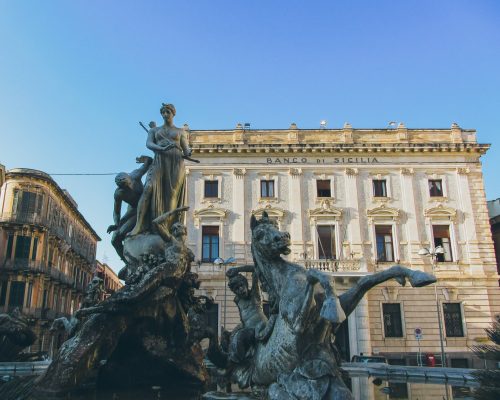
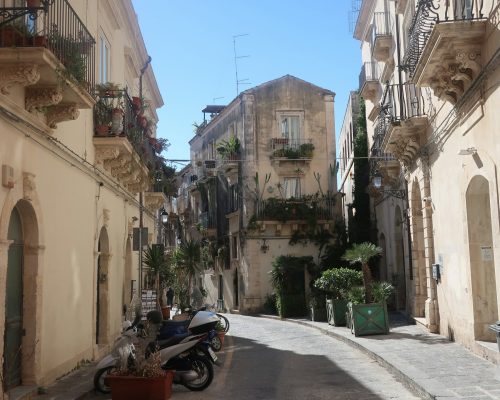
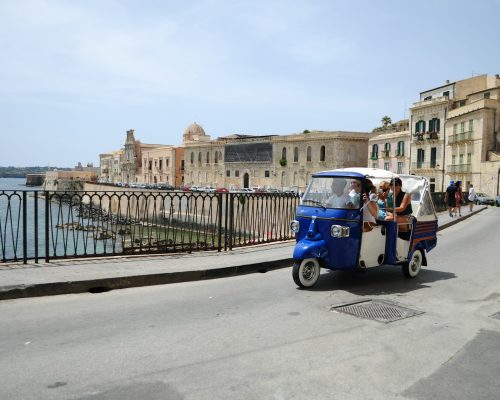
Agrigento: Where Temples Touch the Sky
Agrigento, on Sicily’s southern coast, is home to one of the most awe-inspiring archaeological sites: the Valley of the Temples. This UNESCO World Heritage site is a grand collection of ancient Greek temples, breathtaking in their preservation and scale.
Valley of the Temples
Imagine standing on a ridge with the Mediterranean Sea sparkling in the background, surrounded by monumental temples like the Temple of Concordia, the Temple of Juno, and the Temple of Heracles.
Built between the 5th and 6th centuries BC, they’re a majestic window into ancient Greek grandeur.
Immersive Museum Experience
Complement your temple tour with a visit to the Regional Archaeological Museum of Agrigento. Its extensive collection of artifacts from different eras will add depth to your understanding of this ancient site.
Modern Charm
While the ruins take center stage, Agrigento’s modern town is no slouch. Wander through charming streets, explore bustling markets, and indulge in some authentic Sicilian cuisine. A sunset stroll through the historic center is a must.
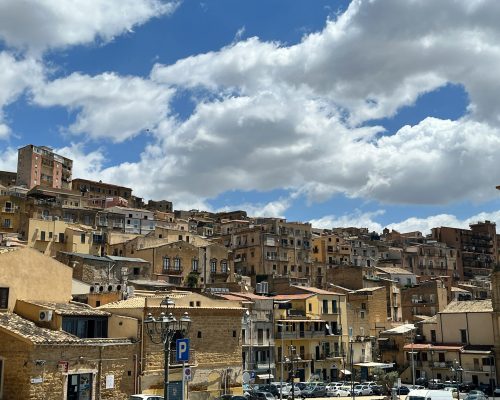
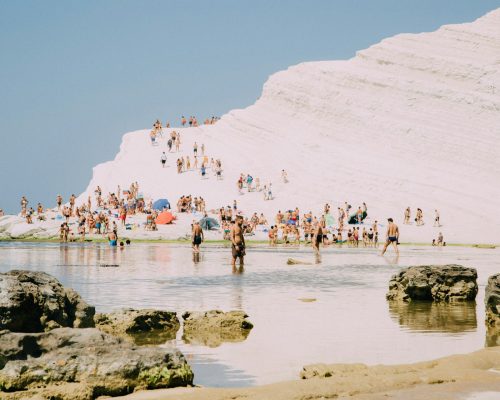
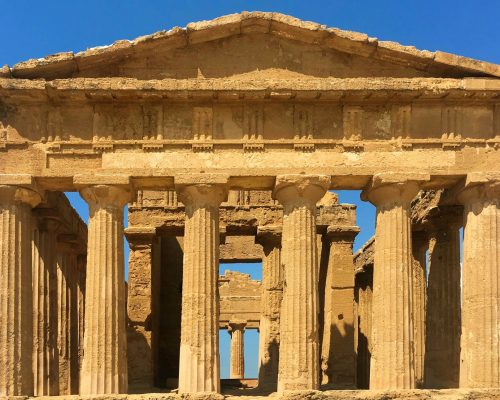
Ragusa: Baroque Brilliance
Last but not least: Ragusa. Nestled in southeastern Sicily, this town captivates with its striking Baroque architecture and dramatic landscapes. Post-1693 earthquake, Ragusa was split into two parts: Ragusa Ibla (the old town) and Ragusa Superiore (the newer section).
Enchanting Ragusa Ibla
Get lost in the maze of narrow streets, staircases, and Baroque marvels of Ragusa Ibla. The Duomo di San Giorgio stands magnificently over the main square, a prime example of Sicilian Baroque at its finest. For some tranquility, don’t miss the Giardino Ibleo. The landscaped gardens and sweeping views are pure bliss.
Ragusa Superiore
Up in Ragusa Superiore, you’ll find wider streets and modern amenities. Highlights include the Cathedral of San Giovanni Battista and Palazzo Zacco. The steep staircases connecting the two parts of town offer scenic routes—and a bit of a workout!
A Gastronomic Delight
Ragusa’s culinary scene is another highlight. Picture yourself enjoying ricotta-filled pastries, hearty meat dishes, and fresh pasta in cozy trattorias. Food lovers will relish the local markets brimming with regional delicacies.
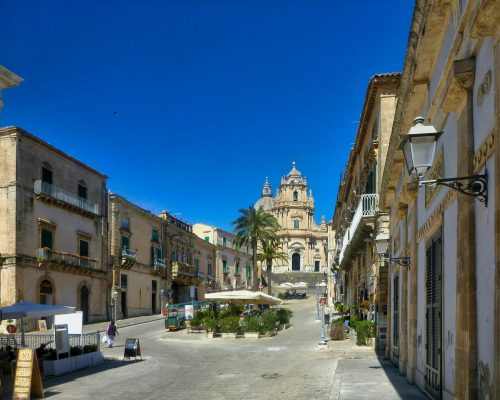
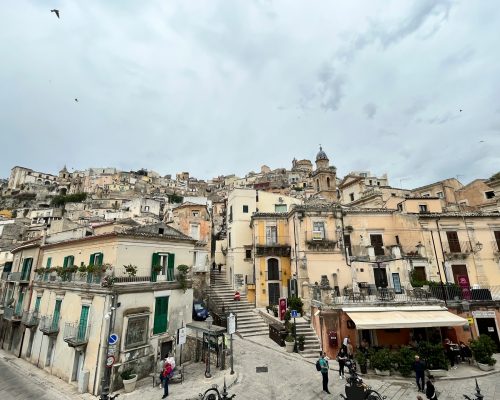
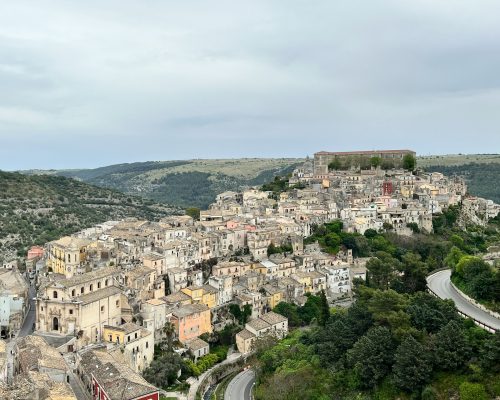
Practical Tips for Your Sicilian Sojourn
Visiting these top Sicilian towns? Here are some nuggets of wisdom to help you make the most of your trip.
Getting Around
Sicily’s transport network is robust, with buses, trains, and rental cars at your disposal. To explore towns like Palermo and Taormina, renting a car gives you more flexibility, especially for remote sites like Agrigento’s Valley of the Temples. But, within the towns, nothing beats the charm of exploring on foot.
Timing Your Visit
The sweet spot for visiting Sicily is spring (April to June) or fall (September to October). You’ll enjoy mild weather and fewer tourists. Summers can be scorching and packed, especially in beach towns.
Where to Stay
From swanky hotels and charming B&Bs to budget hostels, Sicily’s got it all. For an extra sprinkle of magic, consider staying in historic buildings converted into hotels in towns like Ragusa and Syracuse.
Local Etiquette
Sicilians are famous for their warm hospitality, but mind your manners. Dress modestly at churches and religious sites, and learning a few basic Italian phrases will go a long way in showing respect and garnering smiles.
Savor The Flavor
Foodies, rejoice! Don’t leave without trying pasta alla Norma, caponata, and refreshing granita. Markets are perfect for picking up fresh produce and regional delights. If you’ve got time, a cooking class is a fun way to bring a piece of Sicily home with you.
Conclusion
Sicily is more than a destination—it’s an experience. From ancient ruins and Baroque masterpieces to lively markets and stunning landscapes, the island never ceases to amaze. Whether you’re exploring the ancient wonders of Syracuse, marveling at Agrigento’s temples, or soaking in a Taormina sunset, Sicily promises to captivate your heart and soul. Safe travels, and enjoy every magical moment!
Frequently Asked Questions (FAQs)
1. What is the best time of year to visit Sicily?
The best times to visit Sicily are during the spring (April to June) and fall (September to October). These seasons offer mild weather, fewer tourists, and vibrant landscapes. Summer can be very hot and crowded, especially in popular coastal towns like Taormina.
2. How can I get around Sicily?
Sicily has a comprehensive transport network, including buses, trains, and rental cars. While public transport can take you to major towns and cities, renting a car provides more flexibility, particularly for exploring remote areas and archaeological sites. Within the towns, walking is often the best way to explore the narrow streets and local attractions.
3. What are some must-try Sicilian dishes?
Sicilian cuisine is diverse and flavorful. Some must-try dishes include:
- Arancini: Fried rice balls typically filled with ragù, cheese, and peas.
- Pasta alla Norma: Pasta with tomatoes, fried eggplant, ricotta salata, and basil.
- Caponata: A sweet and sour eggplant dish with tomatoes, celery, olives, and capers.
- Cannoli: Crispy pastry tubes filled with sweet ricotta cheese.
- Granita: A semi-frozen dessert made from sugar, water, and various flavorings such as lemon, almond, or coffee.
4. Are there any special cultural etiquette rules I should be aware of?
Sicilians are known for their hospitality and friendliness, but it’s important to respect local customs. Dress modestly when visiting churches and religious sites. Learning a few basic Italian phrases, such as “buongiorno” (good morning), “per favore” (please), and “grazie” (thank you), is appreciated and can go a long way in making connections with locals.
5. Is it safe to travel to Sicily?
Sicily is generally safe for travelers, with the usual precautions. As with any travel destination, be aware of your surroundings, especially in crowded areas and tourist hotspots where pickpocketing can occur. Keep your belongings secure and avoid displaying valuables.
6. What should I pack for a trip to Sicily?
What you pack will depend on the season:
- Spring/Fall: Light layers, a jacket, comfortable walking shoes, and an umbrella.
- Summer: Lightweight clothing, sun protection (hat, sunglasses, sunscreen), swimwear, and comfortable sandals.
- Winter: Warm layers, a coat, and comfortable walking shoes.
Regardless of the season, bring a good camera, a reusable water bottle, and a daypack for daily excursions.
7. Can I use credit cards in Sicily?
Credit cards are widely accepted in hotels, restaurants, and shops in larger towns and tourist areas. However, it’s advisable to carry some cash, especially when visiting smaller towns, markets, or rural areas where card facilities might not be available. ATMs (bancomats) are readily available in most places.
8. What languages are spoken in Sicily?
Italian is the official language of Sicily. In tourist areas, many people also speak English, especially those working in hospitality and tourism. However, in more remote or rural areas, English may be less common, so knowing some basic Italian phrases can be very helpful.
9. Are there any special festivals or events in Sicily that I should plan my visit around?
Sicily hosts numerous festivals and events throughout the year. Some notable ones include:
- Festa di Sant’Agata (Catania, February): A major religious festival honoring the city’s patron saint.
- Infiorata di Noto (Noto, May): A vibrant flower festival where the streets are decorated with intricate flower carpets.
- Palio dei Normanni (Piazza Armerina, August): A medieval festival with historical reenactments.
- Sagra del Mandorlo in Fiore (Agrigento, February/March): Celebrates the almond blossom season with traditional music and dance.
10. What are the top attractions in Palermo?
In Palermo, don’t miss:
- Palermo Cathedral: A UNESCO World Heritage site with a mix of architectural styles.
- Palazzo dei Normanni: Home to the Cappella Palatina, renowned for its stunning mosaics.
- Teatro Massimo: One of the largest opera houses in Europe.
- Ballarò and Vucciria Markets: Lively markets offering local foods and crafts.
- Quattro Canti: A historic Baroque square in the city center.
Helpful Travel Planning Tips
Flights:
Search and book with ORBITZ. They search across 100s of travel sites to compare prices. If you are not ready to book? Set alerts for when prices drop.
Accommodations:
To book a hotel, check Hotels.com
Check here for Hostels
Travel Insurance:
I recommend getting travel insurance from Travelex Insurance to protect your purchase as soon as you book.
Activities:
For tickets, tours, and day trips, check with KLOOK.
Restaurants:
Disclosure: Please note that some links on this website are affiliate links. At no cost to you, I receive a commission if you make a purchase. I only recommend companies that I research and would use.
